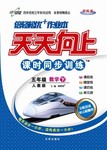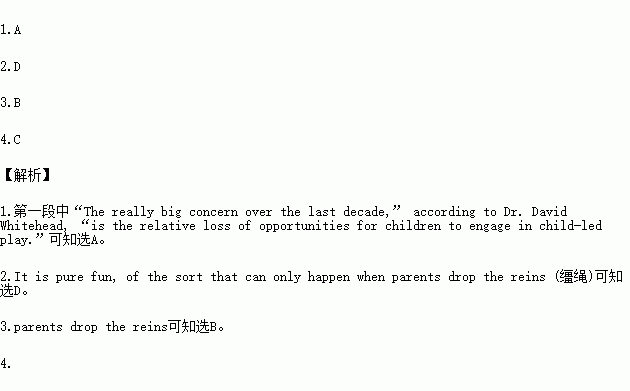题目内容
D
“The really big concern over the last decade,” according to Dr. David Whitehead, “is the relative loss of opportunities for children to engage in child-led play.” That's true. One of the exhausting aspects of modern parenting is that everything, even doing nothing, has to be purposeful. Now that “parenting” has become a verb — a state of doing, rather than simply being — it can fed unnatural to leave your children to their own devices. Yet it creates spaces in which good things can happen. The psychology lecturer is responding to a survey showing that 80 percent of parents of small children feel under pressure to fill their days with “structured” activities. This, says Dr. Whitehead, is a mistake. Leaving your children to play on their own or with their peers enables them to develop “self-regulation abilities”, which in turn leads to better academic achievement.
One afternoon last autumn, sitting on a bench doing no parenting at all, I suddenly felt I was getting the hang of it.
That afternoon, my sister and I took our children to the park. We had lots to talk about, so we sat down on a bench and drove the children away. After briefly complaining, the cousins wandered off and started jumping into puddles (水洼).
They jumped and jumped, and then one of them kicked some muddy water at the others. My sister and I, deep in conversation, didn't notice this. So my nephew became more adventurous. He scooped up a handful of mud and threw it on my son's head. My son caught his breath happily, wiped the mud out of his eyes, and threw one back. My nephew, who has a talent for naming things, puffed out his tiny chest and roared: “Let's play Muddikins!”
The rules of Muddikins are simple. You run around throwing mud at each other until everyone is so thickly coated that you can no longer be sure which child is whose. Nothing is learnt from it; nobody is improved. It is pure fun, of the sort that can only happen when parents drop the reins (缰绳). They did it. “ Whoa, that's so cool,” said one. “I wish my mum was like you.”
1.What is stressed in Paragraph 1?
A. Child-led play matters in the development of children.
B. Parents' concern over their children is unnecessary.
C. Children's activities should be well organized.
D. Parenting is everything in a family.
2.What does the author think of the behavior of the children in the puddles?
A. Amazing. B. Troublesome.
C. Adventurous. D. Worthwhile.
3.By saying “They did it” in the last paragraph, the author means that ______.
A. The reins were dropped.
B. She failed to distinguish her child.
C. The children learned from the Muddikins.
D. She confirmed Dr. David Whitehead's theory.
4.The text is mainly about the relationship between _____.
A. parents and children
B. individual and group
C. play and acquisition
D. theory and practice
 赢在课堂名师课时计划系列答案
赢在课堂名师课时计划系列答案 天天向上课时同步训练系列答案
天天向上课时同步训练系列答案
